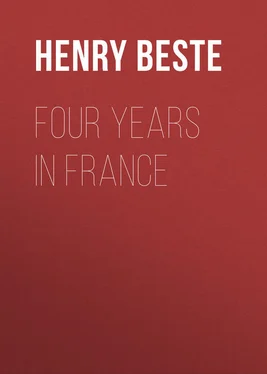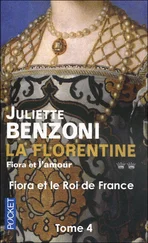Henry Beste - Four Years in France
Здесь есть возможность читать онлайн «Henry Beste - Four Years in France» — ознакомительный отрывок электронной книги совершенно бесплатно, а после прочтения отрывка купить полную версию. В некоторых случаях можно слушать аудио, скачать через торрент в формате fb2 и присутствует краткое содержание. Жанр: foreign_antique, foreign_prose, Путешествия и география, на английском языке. Описание произведения, (предисловие) а так же отзывы посетителей доступны на портале библиотеки ЛибКат.
- Название:Four Years in France
- Автор:
- Жанр:
- Год:неизвестен
- ISBN:нет данных
- Рейтинг книги:4 / 5. Голосов: 1
-
Избранное:Добавить в избранное
- Отзывы:
-
Ваша оценка:
- 80
- 1
- 2
- 3
- 4
- 5
Four Years in France: краткое содержание, описание и аннотация
Предлагаем к чтению аннотацию, описание, краткое содержание или предисловие (зависит от того, что написал сам автор книги «Four Years in France»). Если вы не нашли необходимую информацию о книге — напишите в комментариях, мы постараемся отыскать её.
Four Years in France — читать онлайн ознакомительный отрывок
Ниже представлен текст книги, разбитый по страницам. Система сохранения места последней прочитанной страницы, позволяет с удобством читать онлайн бесплатно книгу «Four Years in France», без необходимости каждый раз заново искать на чём Вы остановились. Поставьте закладку, и сможете в любой момент перейти на страницу, на которой закончили чтение.
Интервал:
Закладка:
The other method of defending the reformation of the Church of England, is by admitting, that the Church of Rome, as the Anglicans call it, has been, and is, a true church, teaching with authority all doctrines necessary to salvation; that the Church of England, having purified itself from errors and abuses, is also a true church, an integral portion of the catholic or universal church, with all the authority to such a body ecclesiastical, of due right, appertaining.
This statement compels the Church of England to assert for itself something like infallibility; for, as Voltaire expresses it, "L'église catholique est infaillible, et l'église Anglicane n'a jamais tort." This must be so; for the authority of a church which may be in the wrong, must be always questioned.
This statement also deprives the Church of England of all advantage in arms (theological arms I mean,) against the dissenters and other reformers: they turn upon her, and ask how she is more infallible, or even more in the right, than the Church of Rome. The Kirk of Scotland will no more allow itself to be in the wrong than the Church of England. Thus disputes are endless; appeals to remote antiquity, instead of uninterrupted tradition, involve the matter in hopeless intricacy; and the private judgment of nations has no more weight than the private judgment of individuals.
Such are the two modes of defending England's reformation adopted by the low and the high church parties, which once declaredly and still insensibly divide its clergy. I have explained both methods, as they are better understood by being contrasted: I have noted the vice of each, that I may give in part my reasons for rejecting both in due time. Till this due time arrived, I was induced to embrace, and, for the time, conscientiously embraced, the opinions of a high churchman; and I was induced to this by the arguments and example of my friend Richard Paget.
At the time when I became a member of Magdalen College, he had just taken the degree of Bachelor of Arts. A young under-graduate cannot help regarding with some deference one already in possession of the first of those academical honours to which himself aspires. Paget was besides three or four years older than me. This advantage of degree and age was not so great as to cause any subjection on my part; I looked up to him, but, if the pun may be allowed, did not suspect him. He, on his part, treated me with the greatest kindness and familiarity. He was, as he said, the second son of a second son of a second son of a younger branch of a noble family. He had not much given himself to classical studies, but he was well skilled in antiquities, including heraldry; witness the exactitude of his own pedigree: he was well read in English history, particularly that of the time of Charles I. with every personage of which he might be said to be intimately acquainted. He had a great love and good taste for the fine arts and for music. His conversation was, in the highest degree, pleasing; it was lively, allusive, full of anecdote: his manner of expressing himself was at once forcible and easy; his judgment was discriminating, his temper gentle and equal. I never think of him without regretting his loss; and he is often recalled to my memory by the benefit and instruction which I have derived from his friendship.
We used to sit together hour after hour, cozing: I believe I must thus spell the word we have derived from the French causer ; no other word has the same meaning. He would take up scraps of paper, and draw admirable caricature likenesses of the members of the college, not sparing the person before him; then a stroll round the walks; and then, as we passed by the door of my rooms on our return, "come in again," and so, another hour's coze. Soon after the commencement of our acquaintance, he began the studies which he thought requisite as a preparation for being ordained a minister of the Church of England. I had the result of these studies, which he pursued according to his own taste, for there is or was no rule in this matter: great admiration of the character of Archbishop Laud; lamentation of the want of splendor and ceremonial in the Anglican service; blame of those clergy who allowed church authority to slip from their hands, lowering themselves into teachers of mere morality. He gave himself very little trouble about the opinions of the dissenters, condemning them all in a lump by a sort of ecclesiastical and political anathema; but he took great pains to convince himself that the Church of England was in the right in its polemical dispute with the Church of Rome. He was willing to allow to the bishop of that city a préséance above all other bishops, not merely on account of the former imperial dignity of the city, but also on account of his succession to St. Peter, who had the same precedence among the apostles, though the privileges of the apostles were equal, as those of bishops ought to be. He saved the indefectibility of the church, by declaring that the Church of Rome was a true church, though not a pure church; that papists might be saved, since what they believed amiss did not destroy the effect of what they believed aright. He affirmed, that the separation of the Church of England from the Church of Rome was the pope's fault; that England had not separated from Rome, but had exercised its right of reforming errors in faith, and abuses in discipline, and approached nearer to the primitive model; that the pope, in excommunicating England for having done thus, had in fact, excommunicated himself. On several points he showed the practice of Rome to be right; on others, to regard things indifferent.
Many other matters relating to this subject were discussed in our conversations, occasionally resumed during the continuance of my friend's residence in college. He was ordained deacon, and some two years after died.
In the year 1791 I took my Master of Arts' degree in Act term, that is, in the beginning of summer, and went to Lincoln to pass some time with my mother, before I should put into execution a project which I had long meditated of a journey to France and Italy. Between my Bachelor's and Master's degrees, as I had no excuse for non-residence in college, I had been obliged to reside: indeed I was sufficiently fond of the literary leisure which this mode of life secured to me. I had always considered myself as destined to Anglican orders; it was the profession which my father had chosen for me, and I had, in some sort, prepared for it: I had confirmed myself in high church principles, and read a little Hebrew; but I had also studied the French and Italian languages for the use and service of my foreign travels, as also because it was rather my wish and ambition to enter on the diplomatic career, if I should find occasion and protection. But how could any one propose to himself to pass any length of time on the continent, agitated, as it now was, by the beginnings of the French revolution? Many ventured to go abroad; but I was alarmed: the unsuccessful attempt of the king and queen of France to escape to Montmedi had thrown France into confusion: it was evident that a crisis was at hand.
I waited. During this time a violent inflammation in my eyes (a complaint to which I had been often subject, and which will, I fear, in its consequences, finally deprive me of sight,) confined me to the house, and prevented me from reading for some weeks. Deprived of the use of books, at all times my chief employment and consolation, and compelled to occupy myself with my own thoughts, I passed in review the topics by which men are usually induced to devote themselves to the more immediate service of God. My education, whatever may have been its influence on my virtue, had been regular, monkish even, if any one please to call it so: the feeling of piety had never been entirely renounced by me; and I now easily brought myself to entertain the hope that, by entering into the ecclesiastical state, I might be of some use to the cause of religion. The first day that my eye-sight was restored to me, I wrote to the president of Magdalen College, then bishop of Norwich, requesting to be admitted as a candidate for deacon's orders at the next ordination in September.
Читать дальшеИнтервал:
Закладка:
Похожие книги на «Four Years in France»
Представляем Вашему вниманию похожие книги на «Four Years in France» списком для выбора. Мы отобрали схожую по названию и смыслу литературу в надежде предоставить читателям больше вариантов отыскать новые, интересные, ещё непрочитанные произведения.
Обсуждение, отзывы о книге «Four Years in France» и просто собственные мнения читателей. Оставьте ваши комментарии, напишите, что Вы думаете о произведении, его смысле или главных героях. Укажите что конкретно понравилось, а что нет, и почему Вы так считаете.











